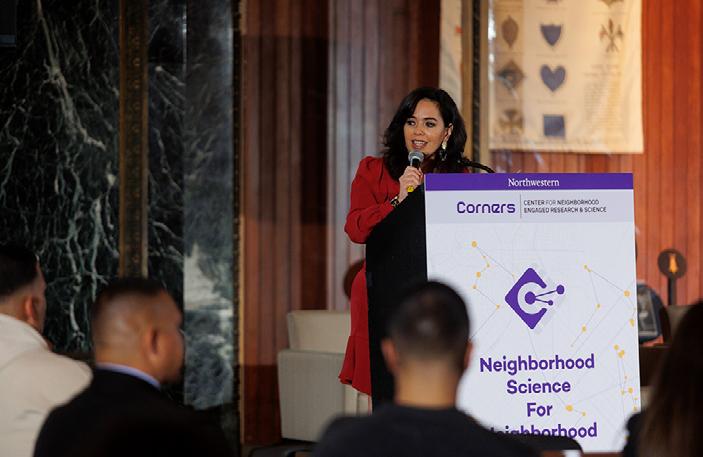
3 minute read
Exploring Black Girl Space
17 million Americans bought one or more guns in 2020
The development of Black girls and Black girl space, or a space designed for Black girls, have been understudied in academic research. In the Journal of Research on Adolescence, IPR developmental psychologist Onnie Rogers and her coauthor examine the meaning and potential of spaces that intentionally serve Black girls in an effort to counter the racist and sexist cultural norms that threaten Black girls’ identities and sense of wellbeing.
Advertisement
The researchers used data from a larger longitudinal study of Black girls attending a predominantly Black all-girls school, a Black girl space, that offers workshops and mentorships from Black women and programming directed toward the Black girls. They analyzed open-ended interviews conducted in 2018 with 17 Black high school girls to understand how they made sense of their school. The researchers asked the girls whether they liked school, the relationship between students and teachers, and the importance of having a school like theirs exist. In the interviews, the girls discussed relational challenges they experienced at school but also how they felt known in their school by being surrounded by so many other Black girls and women. They also talked about their frustration with a school policy banning cell phones when their school’s technology didn’t always work and problems with the structure of the school and general lack of funding.
The findings show how Black girls were able to see the school as a place of resistance to tell counternarratives about being a Black girl, but they also recognized how the physical space posed barriers and reinforced inequalities, such as few extracurriculars and academic resources. The researchers argue that when cultivating Black girl space, experiencing connection with other Black girls matters, but so does the physical space, policies, and funding structures that regulate it.
Onnie Rogers is associate professor of psychology and of education and social policy and an IPR fellow.
A record-breaking 17 million Americans bought one or more guns in 2020, and the gun-buying spike continued into 2021. This new wave of gun owners is more likely to distrust government, believe in conspiracies, and support political violence, a national survey shows. The research establishes, for the first time, a connection between gun buying during the COVID-19 pandemic and political attitudes and behaviors that challenge the state. Compared to other Americans, new gun owners exhibit strong conspiracy and anti-government beliefs, the research uncovers.
“The gun-owner population seems to have a fair amount of power in shaping policy, and you’re getting a population that is moving in a more extreme direction,” said IPR political scientist James Druckman, who co-authored the working paper. Between September 2020 and June 2021, Druckman and his colleagues from Columbia University, Northeastern University, and the University of Pennsylvania, surveyed more than 51,000 individuals in four waves.
The researchers find those who purchased guns during the pandemic were more likely to hold conspiracy beliefs, such as misinformation surrounding the COVID-19 vaccine.
James Druckman is the Payson S. Wild Professor of Political Science and IPR associate director.
Interventions to Reduce Partisan Animosity

Partisan animosity is rising in the United States, which may reduce support for democracy, strain social connections, and undermine policymaking. In Nature Human Behavior, social psychologist and IPR associate Eli Finkel and his colleagues review interventions to reduce partisan animosity, using the TRI framework, a term they coin to capture three levels of interventions: thoughts, relationships, and institutions. They examine interventions in thoughts (correcting misperceptions and highlighting commonalities), relationships (building dialogue skills and fostering positive contact), and institutions (changing public discourse and transforming political structures), highlighting real interventions conducted by nonprofits. For example, they point to Public Agenda’s “Hidden Common Ground” initiative, a large-scale effort that seeks to help Americans recognize commonalities they share through research, journalism, and public engagement. To foster positive contact between partisans, the organization Braver Angels hosts discussions between people of different political backgrounds, focusing on policy issues they have in common. To make real change on a large scale, the researchers argue that practitioners must motivate people to form relationships with those from the other party and mobilize Americans to push for institutional change, such as changing the public discourse. The researchers suggest that to create more effective interventions to reduce partisan animosity, future research consider four issues: variation, replicability, scope, and interdisciplinarity.
Eli Finkel is professor of psychology and management and organizations and an IPR associate.










